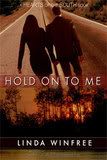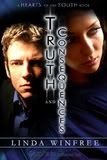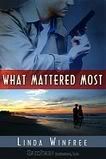Keepers
When we added on to our house two years ago, I had one requirement for our new bonus room: bookshelves. Lots and lots of bookshelves. DH wanted all those "guy" things - a rock fireplace, big flat screen TV, comfy leather couch, pool table, speakers in the ceiling, yadda yadda yadda. I only wanted bookshelves. I got what I wanted.
Our bonus room ended up being 20x26 feet, with the longest wall housing DH's rock fireplace and flat screen TV and my bookshelves that run from end to end on both sides. The bottom third have doors where the Gremlins store their books and games and crafts, but the top two-thirds are all mine. What do I have up there? Well what do you think? Books!
Actually, there's a lot of stuff up there - picture frames and plants, trinkets and crafts my kids have made prominently displayed for all to see. But there are also lots and lots of books. Leather encyclopedias, gardening books, history books, yearbooks, how-to books, my writing craft books and DH's sports books. My favorite part of the shelves though are those sections where I've displayed the special fiction books I've acquired over the years, the ones I consider "keepers". The ones I won't part with for anything. And surprisingly, I have quite a few.
Brenda Coulter recently blogged about Writing Ups And Downs over at Romancing The Blog, and her post got me thinking about what turns a book from a good read into a keeper. I pulled down a few of my keepers last night just for a glimpse, and you know what I found? The books I love aren't full of stellar writing and glowing prose. In fact, some have major flaws that, if committed by an unpublished author, would never see the light of day - things like too much back story, info dumps, head-hopping, repetitive dialogue tags, pages of description, and on and on. As a reader, I overlooked those errors. Even as a writer I overlooked them because the story and characters were so riveting I couldn't "see" anything else. It's only when I go back through and try to analyze the author's style that those things pop out at me.
Why is that? I can spot bad writing a mile away. Mediocre writing in an average book only holds my interest for so long. The key for me though is if I'm invested in the characters, the writing isn't nearly as important as what's happening between the characters. What makes these books memorable is they're full of deep, rich character. In this day and age where you hear over and over again about the "rules" every writer should know and follow and how good writing trumps all, the real truth isn't that phenomenal writing makes the biggest impact, it's that amazing characters do. Characters you can't stand to part with when the book ends. Characters you think about long after you've turned that last page. Characters who make you imagine "post" stories and adventures in your head. THAT to me is phenomenal writing. Not how many times an author used the word "that" or how many times they changed POV in a scene or the long passage of back story their editor didn't catch.
When it comes down to it, your writing is only as good as the characters you create. Perfect writing and average characters equals a book I'll never pick up again and won't recommend to my friends. I don't care if there isn't a single grammatical error in the whole book. I don't care if the prose gleams like a diamond. If the characters aren't special, it'll never be a keeper for me.
Make your characters deep. Make them rich. Make them so inspiring readers can't stand to part with them when the book is over. Do that and stop worrying so much about the rules.
What makes a keeper book for you?
Our bonus room ended up being 20x26 feet, with the longest wall housing DH's rock fireplace and flat screen TV and my bookshelves that run from end to end on both sides. The bottom third have doors where the Gremlins store their books and games and crafts, but the top two-thirds are all mine. What do I have up there? Well what do you think? Books!
Actually, there's a lot of stuff up there - picture frames and plants, trinkets and crafts my kids have made prominently displayed for all to see. But there are also lots and lots of books. Leather encyclopedias, gardening books, history books, yearbooks, how-to books, my writing craft books and DH's sports books. My favorite part of the shelves though are those sections where I've displayed the special fiction books I've acquired over the years, the ones I consider "keepers". The ones I won't part with for anything. And surprisingly, I have quite a few.
Brenda Coulter recently blogged about Writing Ups And Downs over at Romancing The Blog, and her post got me thinking about what turns a book from a good read into a keeper. I pulled down a few of my keepers last night just for a glimpse, and you know what I found? The books I love aren't full of stellar writing and glowing prose. In fact, some have major flaws that, if committed by an unpublished author, would never see the light of day - things like too much back story, info dumps, head-hopping, repetitive dialogue tags, pages of description, and on and on. As a reader, I overlooked those errors. Even as a writer I overlooked them because the story and characters were so riveting I couldn't "see" anything else. It's only when I go back through and try to analyze the author's style that those things pop out at me.
Why is that? I can spot bad writing a mile away. Mediocre writing in an average book only holds my interest for so long. The key for me though is if I'm invested in the characters, the writing isn't nearly as important as what's happening between the characters. What makes these books memorable is they're full of deep, rich character. In this day and age where you hear over and over again about the "rules" every writer should know and follow and how good writing trumps all, the real truth isn't that phenomenal writing makes the biggest impact, it's that amazing characters do. Characters you can't stand to part with when the book ends. Characters you think about long after you've turned that last page. Characters who make you imagine "post" stories and adventures in your head. THAT to me is phenomenal writing. Not how many times an author used the word "that" or how many times they changed POV in a scene or the long passage of back story their editor didn't catch.
When it comes down to it, your writing is only as good as the characters you create. Perfect writing and average characters equals a book I'll never pick up again and won't recommend to my friends. I don't care if there isn't a single grammatical error in the whole book. I don't care if the prose gleams like a diamond. If the characters aren't special, it'll never be a keeper for me.
Make your characters deep. Make them rich. Make them so inspiring readers can't stand to part with them when the book is over. Do that and stop worrying so much about the rules.
What makes a keeper book for you?







3Comments:
Same thing. Characters! All my keepers have characters I didn't want to leave.
The books I keep are typically page-turners. The ones I couldn't put down. The ones I stayed up til 4AM to finish cause I couldn't close it and go to sleep. They have unique plots, interesting setting, and as E and Paty have said, characters worth rooting for. I often keep books that have deeply moved me in some way, sometimes a love scene or a particularly poignant inner conflict they've overcome.
Yeah, J, but I bet if your keeper books didn't have memorable characters those love scenes or that inner conflict wouldn't deeply move you.
I love it when the authors of my favorite books give those memorable characters cameo appearances in new books. Melts me. :)
Post a Comment
<< Home